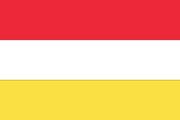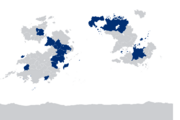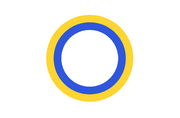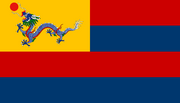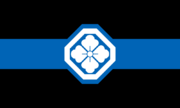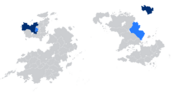Superpower (Kylaris)
Template:Region icon KylarisTemplate:KylarisRecognitionArticle The term superpower is used to describe a state that has the ability to project both hard and soft power globally. Superpowers are distinguished from great powers in that they are able to marshal economic, diplomatic, military, technological and cultural strength in a dominant manner at a global rather than regional scale.
The term was coined in a 1920 essay by Estmerish scholar Arthur P. Randolph to describe the Gaullican Empire.[1] Following the defeat of Gaullica in the Great War, scholars have struggled to come to a consensus on whether certain nations or organisations can be called a superpower, and many agree that the post-war order has generally been multipolar. Since the 1990s there has been renewed interest in the term as several states and international organisations—most prominently the Euclean Community, Shangea and Senria—have been predicted to or have become superpowers in their own right.
Terminology and origin
The term "superpower" was coined in 1920 in the essay A New Solaria: The Case of the Gaullican Empire by Estmerish scholar Arthur Percival Randolph. Randolph stated that the influence of Gaullica in the economic, military, political and cultural spheres was "without precedent" in the history of the world and constituted the first "global power". In analyzing Gaullica's status, Randolph wrote:[1]
Compared to the previous empires that came before it—the Solarians, Verliquoians, Arasanids, Hiang, Soravians—the Gaullican Empire stands heads and shoulders above. Their language is the one of commerce, diplomacy and art from western Euclea to southern Asteria. Their navy traverses every ocean, their army stationed on every continent. Their economy, population and landmass are larger than those of even the Hiau. Theirs is the first civilisation that is truly global. Some lump them in with other great powers of Euclea—Estmere, Soravia, Werania, Etruria—but in truth Gaullica can be seen as the first global power, the first superpower.
Although later bemoaning the term—Randolph preferred what he saw as the more precise term of "global power" to describe Gaullica—it quickly caught on, especially in the context of the rise of functionalism in Gaullica. In the period before and during the Great War, Gaullica's status as "greater than a great power" was commonly accepted as fact by the Grand Alliance, which saw Gaullica as plausibly one day attaining global hegemony unless defeated due to its ability to fight on every continent. Following the Great War, scholars, particularly in Werania, Soravia, and Etruria, further explored the concept of a superpower. Etrurian writer Sabastijan Koštomaj wrote in his 1937 essay Peace and Power that a superpower was a nation that possessed the following:[2]
- a continent-sized landmass,
- a large population, particularly one larger than that of other great powers,
- a diversified, industrial economy that is able to sustain massive production,
- a large and self-sufficient food supply,
- the ability to conduct war on a global scale.
Koštomaj stated that no nation in 1937 possessed these qualities, although he predicted that Soravia, the Etrurian Empire and Senria might one day attain them.
Kirenian scholar Janek Ruutli stated in 1954 that a superpower must be able to "project military, economic, diplomatic and cultural-ideological might globally".[3] After the development of nuclear weapons, Ruutli stated that they were a prerequisite for superpower status, but also drew attention to the fact that a superpower needed a "universalist ideological underpinning" to truly be global on an ideological and cultural level. This idea of an ideological underpinning was supported in 1973 by Gaullican writer Jérémie Boutet, who stated that a superpower was a "combination of both a militarily and politically powerful state with a global mission that is able to penetrate the hearts and minds in any corner of the world".[4]
Mabifian writer Ephraïm Koulsoumi stated that the concept of a superpower could be split into a "state-centric" approach, which he claims is anachronistic in only truly applying to the Gaullican Empire, and a "civilisational-centric" approach that stresses the idea of cultural unity and increasingly ideological multilateralism, which are better indicators of a "superpower" in international relations as they presuppose other traditional indicators of superpower status such as the ability to exert military and economic coercion. Koulsoumi points to the Euclean Community as a prime example of the latter concept and to the Congress of Bahian States as an "aspiring but unrealised" superpower. Koulsoumi's definition, however, was criticised by Hallandic writer Robert Frost who stated that the "ability to dominate and coerce nations militarily, politically and economically on a global scales remains the primary indicator of superpower status".
Historical superpowers
Gaullican Empire
| Gaullican Empire | |||
|---|---|---|---|
The Gaullican Empire, particularly in the period from the mid-1870s to its surrender in the Great War, is usually considered by scholars and commentators to be the "definitive superpower", having been the polity the term was created for. As its height in 1927, the Gaullican Empire collectively had the world's largest population (with metropolitan Gaullica having the largest population in Euclea), landmass, economy, navy and military expenditure. The metropole also had a high standard of living, the Gaullican denar was considered to be the global reserve currency, the Gaullican language was used in diplomacy and commerce and Verlois was considered to be one of the most important cities in the world. Gaullican haute culture was also widely emulated abroad, and the empire had rich traditions in music, literature, science, cuisine, art and fashion.
The global nature of the Gaullican Empire was commonly seen as the key to its classification as a superpower. In addition to its metropole in Euclea, Gaullica had colonies in every continent on the planet: Asteria Superior, Asteria Inferior and Coius (including Rahelia, Bahia, Southeast Coius and South Coius). Many of these colonies also had Gaullican settlers, from majority settler-descendant places such as Cassier and Satucin to smaller communities in places such as Baséland. As a result, the empire was seen not simply as a set of territories ruled by a colonial power—as the Estmerish, Weranian and Etrurian empires often were—but as a far more coherent imperial culture, making the Gaullican Empire more cohesive than its Euclean peers. The embrace of functionalism is also seen by some as having entrenched Gaullica as a superpower, as it presented a single ideological dimension to the Gaullican state.
Most important to Gaullica's status as a superpower was its ability to be able to fight wars globally. This was clearly demonstrated in the Great War, where the Gaullican military was deployed on every front, the only nation to do so. Even on the Senrian front, where fighting was primarily against Shangea, the Gaullican navy played a large role. Gaullica's global fleet and sizeable colonial armies, particularly the Satucine one, were seen as evidence of its superpower status, particularly in comparison to the regional armies and navies of the Grand Alliance. The defeat of Gaullica in the Great War, subsequent dismantling of the Gaullican Empire, discrediting of functionalism and rise of other nations ended Gaullica's period as a superpower.
Although the Gaullican Empire is commonly considered to be a superpower, it is not seen as a hegemon or unipolar power. Writing in 2012, Natalie Lichtwark stated that the period from the First Soravian Civil War to the Great War was a "hybrid system" of a single superpower but numerous great and regional powers whose influence Gaullica could never entirely overshadow. Lichtwark also stated that Gaullica's increasing isolation in the period meant that its power paradoxically increased as it strengthened itself against what it perceived as a hostile coalition of forces.
Potential superpowers
Euclean Community
| Euclean Community | |||
|---|---|---|---|
Scholars dispute whether the Euclean Community can be classed as an actual superpower or a potential one. This debate intensified in the 1980s and mid-2000s with increasing centralisation in the EC.
The EC collectively has the world's largest economy and second-largest population. The citizens of its member states have the highest standard of living in the world as well as some of the strongest civil and political rights. Two of its members, Werania and Estmere, have permanent seats on the Community of Nations Security Council and possess nuclear arsenals. Culturally, EC member states, particularly Gaullica, Estmere and Paretia, have a strong influence globally, and Gaullican remains the global language of commerce and diplomacy.
The status of the EC as a superpower has, however, been questioned. Unlike historical superpowers such as the Gaullican Empire or other potential superpowers such as Shangea and Senria, the EC is not a sovereign state, but rather a supranational organisation. André Laffitte stated in 2016 that the EC, "lacking a common foreign and defence policy, cannot in the traditional sense be considered a superpower", and that the EC, while having a global strategy, still has to navigate the demands of its member states, most notably Gaullica, Estmere and Werania. Laffitte also pointed out that the economic and political asymmetry among EC member states makes uniform policy prescriptions, even with support from national capitals, "difficult to calibrate". Zhu Huiliang pointed out in 2014 that the EC remains a "military non-entity", with Euclean defence affairs mostly handled by the Euclean Common Defence Treaty Organisation (ECTDO). Zhu stated that the perquisite for superpower status is "military reach" and that unless the ECTDO is merged into the EC it is unlikely to be considered a true superpower.
Former Gaullican and Euclean Community President Alexandre Lévesque has rejected the idea of the EC as a superpower, stating that the term was "created to describe the global-hegemonic ambitions of the Gaullican empire". Lévesque has instead stated that the EC represents a "new kind of political relationship that defies the traditional notions of polarity, great powers, et cetera—one built on multilateralism and global solutions".
Since the rejection of EC membership by Etruria in 2016, some have questioned whether the EC meaningfully wields soft power. However, recent moves to continue membership talks with Piraea and Slirnia have been pointed to as proof of the EC's continued appeal.
Shangea
| Auspicious Republic of Shangea | |||
|---|---|---|---|
Shangea is commonly considered a candidate to become a great power, with large amounts of press and academic interest devoted to the topic since the mid-2000s.
Possessing the world's largest population and economy and its second-largest landmass, Shangea also maintains a large military, enjoys high economic growth, wields nuclear weapons, and is the leading force behind the Rongzhuo Strategic Protocol Organisation and International Forum for Developing States. Shangea also has some of the world's largest deposits of natural resources, including rare-earth minerals, and the world's highest industrial output. Shangean culture has in recent years found a global audience, particularly in food and films, that is bolstered by the historical cultural influence of Shangean characters. Rongzhuo, Baiqiao and Shenkong have also joined Jindao as global-level cities.
However, many have stated that Shangea's rise to superpower status is not preordained, and that the nation still has tremendous obstacles to overcome. Cao Meifen pointed out in 2011 that on many social indicators such as poverty, pollution, inequality, corruption, relations between ethnic minorities and the spread of preventable disease, Shangea continues to underperform. Cao stated that whilst Shangea has "very high GDP figures and a large military", unless it can improve social conditions, it will be not seen as a superpower.
Shangea's soft power and its diplomatic image have also drawn attention as potential problems standing in the way of superpower status. Takuboku Utumi noted in 2015 that Shangea is "immensely disliked by a large portion of its neighbours, who see it as an aggressive, arrogant nation". Failure to make amends for crimes against humanity during the Great War has, according to Utumi, "ruined" Shangea's image abroad, making Senria overtly hostile toward Shangea and drawing disapproval from Euclea and Asteria. Lara Blomberg stated in 2019 that in the wake of Normalisation, Shangea's poor human rights record and aggressive foreign policy made talk of its potential superpower status "to the ears of many in Coius and Euclea a cause of concern rather than celebration" and that the continued rise of Shangea was encountering increasing opposition from abroad.
Senria
| Republic of Senria | |||
|---|---|---|---|
Since the mid-1980s there has been increasing press coverage of Senria as a potential superpower.
Between the 1990s and early 2010s, Senria possessed the world's largest economy. It continues to possess the world's second-largest population and economy whilst maintaining steady, albeit unimpressive, growth in both areas. Senria also has one of the largest militaries on the planet (with a particularly powerful navy and air force), regional influence via COMSED, nuclear weapons, a permanent seat on the Community of Nations Security Council, cordial relations with the Euclean Community and the NVO and a diversified industrial economy. Senria is also perceived to project a significant amount of soft power through its food, anime, films, video games and automobiles, a trend known as the Senrian Wave. Keisi, the world's largest city, is considered to be in contention with Verlois for the title of most important city in the world.
Ima Akamatu predicted in 2001 that Senria would ascend to superpower status by 2020 thanks to a "growing economy, a cultural boom that has spread worldwide, decreasing poverty and corruption and an increasing trend towards political liberalisation". Akamasu stated that, under Kiyosi Haruna, Senrian leaders had done better than their Euclean counterparts in finding a national consensus for economic growth, which was seen by other nations in Asteria and Coius "including longtime rivals Shangea" as an attractive path to development.
Théophile Brunet also stated in 2014 that the case for Senria becoming a superpower in the future was "reasonably strong" given the continued success of the Senrian Wave, increasing standard of living in Senria and growing mistrust of Shangea abroad following the 2013 avian flu outbreak. Johnathan Bush also pointed out in 2017 that since the creation of COMSED, Senria had seen increasing levels of immigration from other Coian countries, signalling the attractiveness of Senria as a centre for innovation and opportunity.
However, others have been more cautious in labelling Senria as a potential superpower. In 2018, Fabien Portier noted that Senria "more than any other nation is at risk of falling into the middle income trap", noting that efforts by the Senrian government to shift to a high-income economy had so far yielded subpar results. Portier further elaborated that with the rise of Shangea, Senria has to "show the world it can once again be the centre of innovation and economic prosperity in Coius", but that Senrian businesses and politicians had failed to do this. Portier further stated that Senria risked becoming the "perpetual country of tomorrow" in regard to its global ambitions. Keizi Yamagisi stated in 2015 that Senria's potential as a superpower was limited by Keisi's focus on Shangea and lack of geopolitical strategy compared to Kesselbourg or Rongzhuo. Yamagisi stated that "unless Senrian leaders crafted an engagement strategy with Asteria, a vision towards Bahian development, a rapport with west Euclea, it will be seen at best as an important regional player rather than a global force like the EC".
Others have noted that Senria has failed to tackle corruption, inequality, environmental destruction and an apathy towards politics and the state creed of Imaharism. Slowing economic and population growth and problems regarding high population density and urban management also have been highlighted as obstacles to Senrian superpower status.
Contested cases
Soravia
| Soravian Empire/UPSR | |||
|---|---|---|---|
Some scholars have opined that Soravia has, at some points in its history, fit the profile of a superpower. In particular, scholars point to the period between Soravia's victory in the Great War in 1934 to the start of the Sostava War in 1979 as one where Soravia was the most powerful nation on the planet, if not a superpower. Others have stated that the Soravian Empire constituted a superpower from the mid-1750s to the War of the Triple Alliance.
In 1962, Juan Manuel Águila stated that the Soravian Empire could, with its colonies in Asteria and Satria combined with its dominant position in Euclea, be seen as the "first global civilisation Randolph spoke of in his seminal 1920 essay". However, this view was rejected in 1965 by Godefroy Dembélé, who stated that whilst Soravia was powerful during that period, it was not dominant or hegemonic, with Gaullica, Estmere and Kirenia being more or less on the same level militarily. Dembélé also stated that assigning states the title of superpower prior to the development of the "truly global patterns of commerce and imperialism" during the 19th century is anachronistic.
The All-Soravian Union of Republics (or UPSR) is also sometimes considered to have been a superpower from the conclusion of the Great War to the start of the Sostava War. During the immediate post-war years, it had the largest economy and military in Euclea, with its own nuclear arsenal and a permanent seat on the CN Security Council. Soravia also had a network of alliances with other nations in Coius and Asteria and was an important scientific innovator, most notably in the fields of nuclear research and space exploration. For these reasons, some, such as Raphaël Masson, Asimodeo Maiorino and Eduard Stepanenko, have characterised post-war Soravia as a superpower. However, this view has been criticised by others—Yaroslav Makarenko stated in 1987 that whilst Soravia was the most powerful of the great powers following the Great War, it lacked the economic strength and military reach across the globe to be considered a superpower.
Since the Sostava War and the decline of Soravian military power, most agree that it can no longer be called a superpower and is unlikely to be in a position to become one in the near future. However, in 2014, Théophile Brunet stated that since the consolidation of Samorspi, Soravia can comfortably be considered a "regional superpower" in a similar vein to Zorasan, Satucin and Dezevau.
See also
References
- ↑ 1.0 1.1 Randolph, Arthur P. (1920). A New Solaria: The Case of the Gaullican Empire.
- ↑ Koštomaj, Sabastijan (1937). Peace and Power.
- ↑ Ruutli, Janek (1954). "Revisiting the superpower; military, economic, diplomatic and cultural-ideological might". Political Review (19).
- ↑ Boutet, Jérémie (1973). "Hearts and minds - a new approach to defining a superpower". Politics (99).
